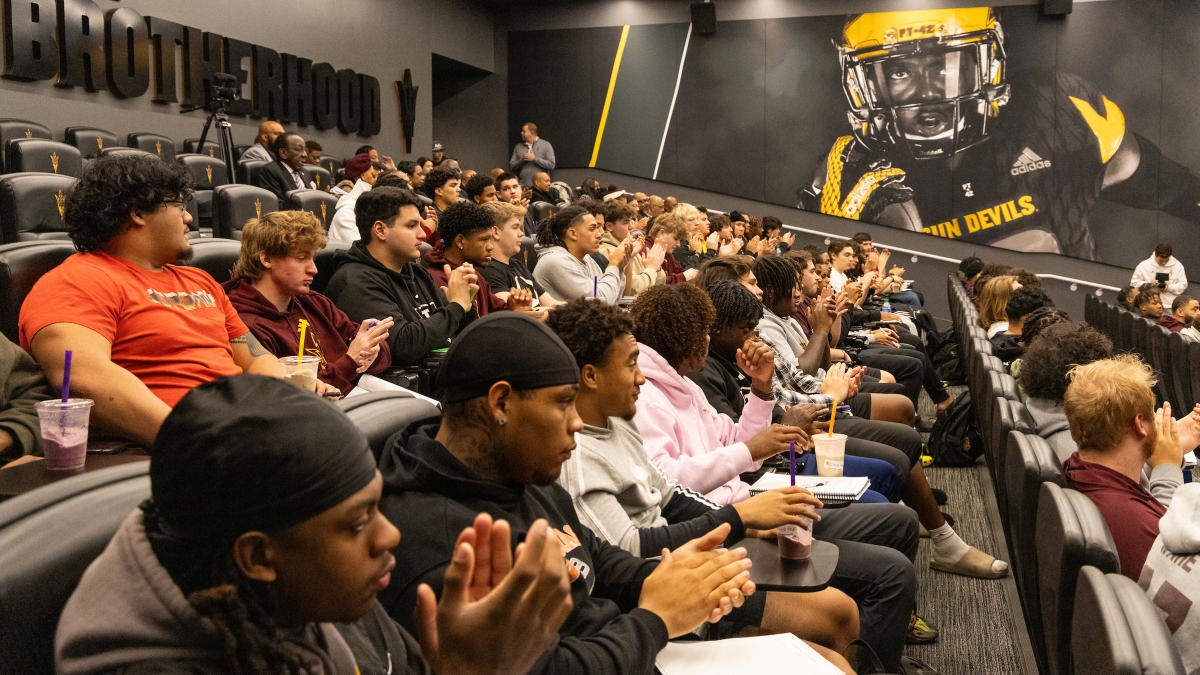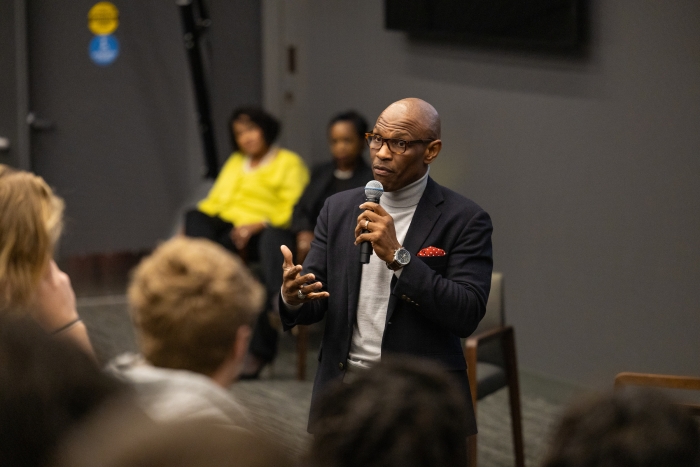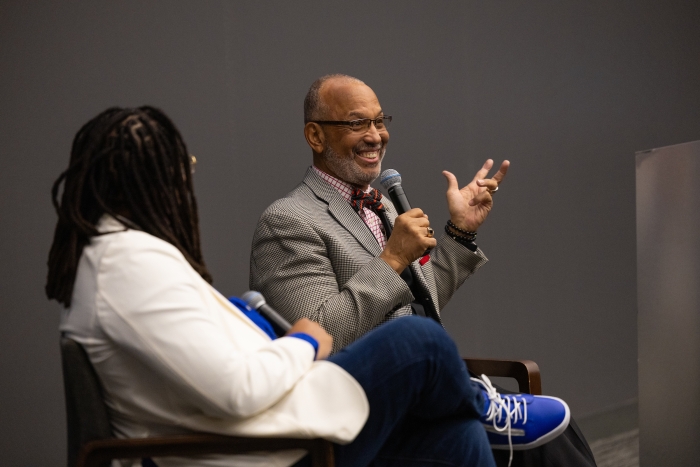ASU football players embrace the teachings of MLK

ASU football players clap during the event "The Dream Continues: The Dr. King Fight for Justice in the 21st Century," held at Mountain America Stadium in Tempe on Jan 12. Photo by Emma Fitzgerald/Arizona State University
Playing college football is a great honor and a privilege, and an experience that should be treasured. But that’s not all there is to life.
How players advance their community and what they do for others will leave a more lasting impression than anything they’ve ever done on the gridiron.
That was one of many messages Arizona State University football players received from community, business, nonprofit and faith-based leaders at a recent event to commemorate the life and legacy of Martin Luther King Jr.
“The Civil Rights Movement was led by young people just like you,” said Warren H. Stewart Sr., senior pastor of the First Institutional Baptist Church in Phoenix and a revered community activist. “My generation is looking for you to take the baton and cross the finish line.”
Titled “The Dream Continues: The Dr. King Fight for Justice in the 21st Century and Beyond,” the Jan. 12 event was sponsored and presented by ASU’s LIFT (Listen, Invest, Facilitate and Teach) initiative, First Institutional Baptist Church and the African American Christian Clergy Coalition.
The goal of the gathering was to inform ASU football players about the ongoing battle to acknowledge King’s history in Arizona, and to engage with community leaders and organizations from across the state to help them with various career and leadership opportunities, according to Dontá McGilvery.
“The MLK event on Jan. 12 is the first of many collaborations,” said McGilvery, coordinator of the Graduate Experience in ASU’s Graduate College. “The hope is to offer ASU football players three things: an opportunity to build mentoring relationships with community/business leaders; help ASU football players gain a better understanding of all that Arizona has to offer; and to help ASU football players find a sense of belonging here in Arizona.”
Chris Howard, executive vice president and chief operating officer of ASU Public Enterprise, made the opening remarks, in which he stressed the importance of building and maintaining community.
“If you read anything about Dr. King, you understand he did extraordinary things in a short amount of time,” Howard said, “ … and if he were still with us today, he’d tell you that he couldn’t have done it alone.”
Howard, a former Rhodes Scholar and running back for the Air Force Falcons, said King had men and women in the church, civil rights movement and in the business community backing him.
“Sun Devils, as members of our beloved community, you are our Dr. Kings,” Howard said. “You go out there and put it on the line. You put your bodies out there for the team, for your brothers to your left and right. And you need a beloved community. You deserve a beloved community. And you will, in fact, have a beloved community that supports you.”
Stewart recounted to event attendees the story of his six-and-a-half-year battle to get Arizona to adopt the third Monday in January as a state holiday in honor of Martin Luther King Jr.
“I watched Dr. King deliver the ‘I Have a Dream’ message on the footsteps of the Lincoln Memorial in August of 1963 on a black-and-white television in my grandparents’ living room,” said Stewart, who has campaigned for several community causes — including care of homeless people and veterans, health care for those in need, neighborhood development for low-income housing and improved mental health delivery services. “When he talked about his dream, he talked about the day when Black and white children would be able to sit down and play together, and that included me. So he planted this seed in my heart.”
The seed germinated into something much bigger in March 1986, when an Arizona house bill to combine existing state holidays for presidents Washington and Lincoln into the Martin Luther King Holiday was defeated by one vote. Nine days after the bill was defeated, Gov. Bruce Babbitt issued an executive order creating a paid MLK holiday. Then that was rescinded by Gov. Evan Mecham in January 1987, who declared the order illegal.
“Arizona’s Black population at the time was 3 1/2%, which meant we had to get people who were not Black to understand that this was not a Black holiday,” Stewart said. “It is an American holiday representing a person in the 20th century who was just as significant as Abraham Lincoln, and just as important as George Washington was in the 18th century.”
Stewart said two propositions in 1990 put the MLK holiday up to a public vote, each one failing to pass.
In 1992, Stewart attempted to galvanize support once more for a MLK holiday as general manager of “Victory Together – One Clear Choice,” a Phoenix-based nonprofit that set up education campaigns throughout Arizona. Their efforts worked.
That November, voters passed a Martin Luther King Civil Rights holiday, making Arizona the last state to formally install the holiday.
Stewart said the victory came at a personal cost — he received threatening phone calls at his house and church, hate mail, and fires were set in the driveway of his home. Phoenix Police even had to install an extra streetlight near his house to ward off potential threats. He said the fight was worth it, and hopes this generation will pick up where he left off.
“I'm too old to do it now,” Stewart said. “I can give you advice, I can help you … but listen, I'm passing it to you.”
Two Sun Devil players heard the message loud and clear.
Linebacker Jordan Crooke said he was moved by the event and will take steps to apply it to his life.
“Just to see people of my color in higher positions talk about unifying people was inspirational,” said Crooke, a transfer student from the University of Arkansas. “They spoke of things that were bigger than me. Together we’re stronger and better.”
Keith Abney, a defensive back from Dallas, Texas, said he appreciated people from the community taking their time to speak to him and his teammates.
“The one quote I took away from all this was that ‘There’s no me without we,’” said Abney, a first-year student majoring in sports business management in the W. P. Carey School of Business. “It was good for our team to hear because we all must come together as a family. We all learned a lot today.”
More Arts, humanities and education

2 ASU professors, alumnus named 2025 Guggenheim Fellows
Two Arizona State University professors and a university alumnus have been named 2025 Guggenheim Fellows.Regents Professor Sir Jonathan Bate, English Professor of Practice Larissa Fasthorse and…

No argument: ASU-led project improves high school students' writing skills
Students in the freshman English class at Phoenix Trevor G. Browne High School often pop the question to teacher Rocio Rivas.No, not that one.This one:“How is this going to help me?”When Rivas…

ASU instructor’s debut novel becomes a bestseller on Amazon
Desiree Prieto Groft’s newly released novel "Girl, Unemployed" focuses on women and work — a subject close to Groft’s heart.“I have always been obsessed with women and jobs,” said Groft, a writing…



